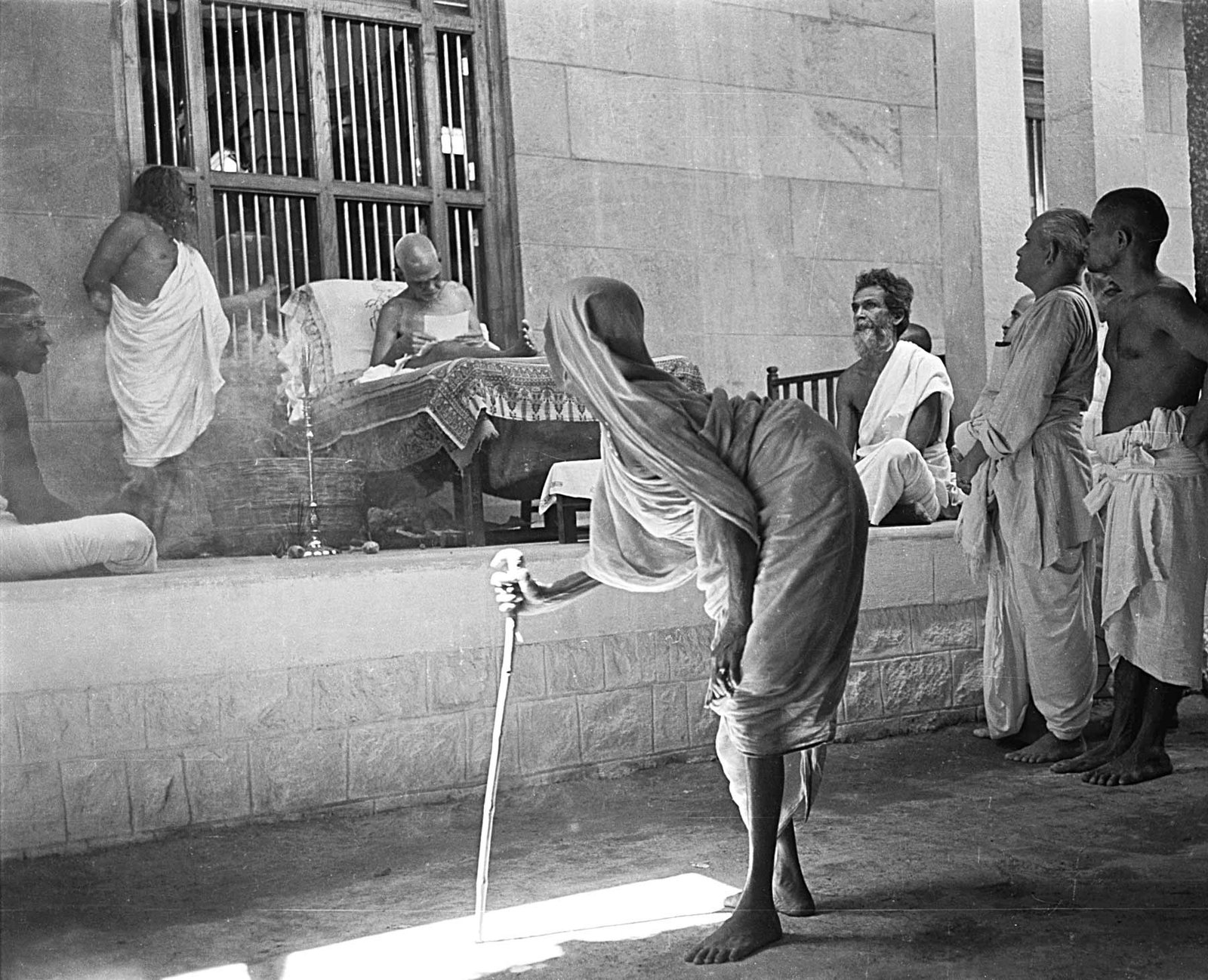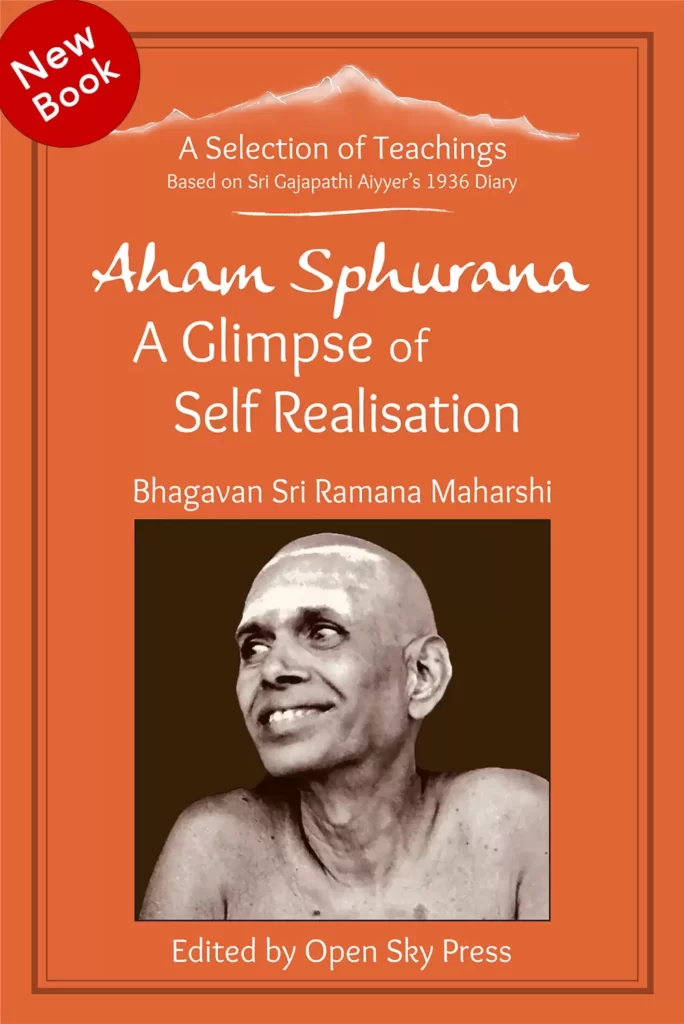
Aham Sphurana
A Glimpse of Self Realisation
New Book about Sri Ramana Maharshi

Available Worldwide
On www.openskypress.com and Amazon:

“In my opinion, Aham Sphurana, a Glimpse of Self Realisation, will become a Treasure Trove of Wisdom to the Seekers of Truth in general, and particularly to the devotees of Bhagavan.”
Swami Hamsananda – Athithi Ashram, Tiruvannamalai
Guru’s Grace
Pages 436-439
Q.: The terms Aham-sphurana [Self-realization] and Sahaja-asamprajnatha-samadhi [oneness with God] are synonymous. Am I correct? _
B.: No.
Q.:Why not?
B.: Sometime after a fire is lit underneath a pot containing water, only an empty pot will be left. Yet, the space inside the pot is always vulnerable to being filled-up again. If the pot is smashed into pieces, it is quite ruined and there can be no scope any more for depositing anything into it.
Sphurana indicates that the exhaustive emptying of the contents of the pot is nearing completion. Sphurana involves not merely a clarity in the state of subjective-awareness-sustained-effortlessly-and-volitionlessly; it also evokes a response from the Deep; therefore, we may say that it encompasses a transcendental aspect; even so, it is still a state of subtle duality.
Duality ceases only after the mind has been irredeemably destroyed. Continuous and unbroken inherence in the sphurana is possible only after the ego has finally surrendered. One who is in such a state of egolessness alone is eligible to awaken into Jnana; such an egoless one cannot want Jnana and neither can he want anything else; this is why it is said that those who want Jnana do not get it. So, when Jnana finally dawns it makes no difference to the sadhaka [practitioner]. Jnana shines forth only well after the ego has been finally given up.
Q.: The fire underneath the pot is the Guru’s Grace. Am I correct?
B.: Yes.
Q.: The pot is the mind. Is that not so?
B.: Yes.
Q.: The contents of the pot are vrittis [structures] of the mind. Have I not made a correct observation?
B.: Yes.
Q.: Can the pot be smashed whilst its contents are yet to be boiled away?
B.: It’s usually impossible. It is not safe for destruction to be suddenly forced upon the mind. The mind must wane and wane and only after it has been reduced into an infinitesimally tiny speck that is incapable of offering any resistance is it finally destroyed by the Self. A motorcar is going at an enormously high speed. If it suddenly encounters a large and heavy obstacle round the bend of a corner, what will happen?
Q.: The occupants of the motorcar will all be killed.
B.: If the driver had applied brakes slowly and steadily over some distance prior and reduced the speed before the obstacle had to be encountered?
Q.: Nothing will happen to them.
B.: Likewise with the mind. For countless births your mental habits have been cherished by you. They will not go down without a fight. The fight does involve pain. Pain is inevitable. Also, these habits will not disappear overnight; do not expect them to vanish all of a sudden.
You will need the patience of the bird that inadvertently laid its eggs in mid-flight whilst gliding over the ocean, and then, being unable to dive into the water as far down as the ocean bed, kept furiously flapping its wings over the surface of the waves, in the hope that one day the effort might make the ocean dry up and reveal her young ones.
Q.: It is absurd. How can the bird’s effort succeed?
B.: Saying, “I shall reach the Self with the mind” is just as ridiculous.
Q.: But how then shall I attain Jnana? Seeing Bhagavan’s noble and saintly countenance, I am also inspired to become a Jnani like him. Is the ambition immoral?
B.: If you will have Realisation you must be prepared to irrevocably relinquish everything you think you have including yourself first and foremost. Every last thing precious in your sight shall have to be given up. What is being spoken of here does not amount to advice to physically remove yourself from your incumbent surroundings. What actually matters is that the mind must be insulated and isolated from its familiar worlds of sense perceptions and intellect fabricated labyrinths, and whisked away into the Heart.
Q.: How then shall I cultivate detachment towards the world?
B.: It is non-attachment that is needed, not detachment, which is merely attachment to the perceived virtue of non-attachment or aversion to the perceived vice of attachment; to be non-attached implies to be non-detached also. Absence of modification of mind is the one and only genuine non- attachment.
Q.: If I give up my fondness for the things of the world, if I mentally give up everything I think I own or cherish, will Jnana be bestowed upon me in return?
B.: In return, you may or may not obtain Jnana: the matter rests at the discretion of the mercy of the Higher Power. In giving up everything, you must give up also your ambition for Jnana. Then this question also cannot arise.
Q.: These are harsh terms.
B.: Yes. But did anybody hold a dagger to your throat and force you to Realise? The honest fact is, those who go crazy with the pain of samsara invariably and inevitably Realise. When the mundane existence has become altogether intolerable and even inconceivable, then Realisation is not far away.
If samsara [illusion] is still acceptable or reckonable to you, will it be possible for you to Realise? One who does not recognise the blatantly self-evident truth that samsara is a curse, not a blessing: can he Realise? There are those who clearly see the patently poisonous nature of samsara; Realisation comes to them in a trice.
Others go on discussing, “I wonder what sadhana I shall perform to Realise the Self? Shall I practise Sri Ramana Bhagavan’s technique to Realise or Sri Aurobindo’s technique?” And so on.
If a piece of live coal falls into your hand, will your first instinct be to drop it, or to ponder, “Now, I wonder if this is charcoal, peat or coke…”? Yet men manage to hold on tenaciously to samsara – how? Because the glove of avidya maya [illusion of ignorance] shields the man from the whole of the impact of the pain.
If he felt the pain at its unmitigated, full impact, he would drop the pain causing excruciation at once, and Reality would be deprived of its fictitious complimentary – counterpart, Maya [illusion].
Since the pain seems prima facie manageable, and to alternate with so-called pleasures, which, unbeknownst to him, are also of the nature of doing and therefore only pain in disguise, man deceives himself into believing that by holding on the glowing piece of coal with which he has been forcibly thrust, he is fulfilling a heroic, enjoyable challenge called life, as a reward for which he is going to avail for himself the emolument he calls pleasure.
Thus, the man on the Clapham omnibus, although he may imagine himself to be comfortably off, lives in pain all the time, ignoring his true nature of Absolute Bliss. Man is led to the belief that samsara is somehow ‘manageable’; for this reason he never really makes any effort to break out of it.
When the Guru’s Grace commences to plunge into operation, the glove of ignorance begins to rupture. Then that fortunate one who is earmarked for total destruction in his incumbent lifetime begins to suffer like never before. His old stance concerning samsara tries to convince him that these bad circumstances are only passing clouds of bad weather, and that soon matters would improve; but no signs of improvement arrive.
Meanwhile, the rupture in the glove has become larger; his hand is squirming with the unbearably scorching blaze of what he had once fondly regarded as a ‘challenge’. Finally, just as the glove is sundered, he sees the pointlessness of offering any more resistance and disgustedly throws away the glowing ember known as samsara.
This is the secret of how Guru ‘s Grace brings about Realisation: he does not bring about Realisation from anywhere; he merely removes the obstacles to it by hastening the devotee’s absolute surrender. Even prior to the latter’s present birth, the benign and compassionate Sadhguru carries out an artful selection from the devotee’s karma, to bring about in that very lifetime the Liberation of the innocent, child-like devotee who has placed the entirety of his trust in Him.
So as to make him surrender heart and soul, mind and body at His feet; thus by the dint of merciless and brutal bombardment of his life with misfortune and misfortune only, he brings him to His feet totally by implanting in him strong aversion to and disgust for samsara. The Sadhguru takes the liberty to adopt this radical approach only in the case of those devotees who have completely placed their lives in His care.
To others, he courteously says, “Please carry on with your sadhana [practice],” and then keeps quiet. Know that if the Sadhguru has decided to grant Liberation to a devotee, even Brahma is powerless to raise any objection. The one fail-proof way to obtain Liberation, therefore, is to win the grace of the Sadhguru.
Q.: [shedding emotional tears] Yes, I am now prepared to renounce samsara completely. Please do with me as you like. Please introduce misfortune in my life if necessary. I shall not resent it.
I want to Realise somehow in this very lifetime. I am prepared to pay any price. Let everything I have ever considered my own be burnt and reduced into smoldering ashes. Let me die as a leper.
But oh! pray, let me have Realisation in this lifetime!
The man was given some water to drink by Bhagavan’s attendant and soon he calmed down.
Bhagavan smiled but did not say anything.
Edited by John David Oct 2021







